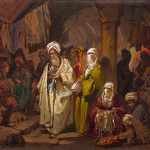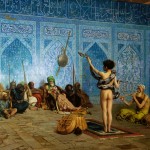There are two big words that have been rambling their way around my mind this week, words from my apprenticeship as a Social Theorist. These two words are Colonising and Orientalizing.
I know these are big words, but stick with me. You trust me, don’t you?
These are terms used to describe Europe’s relationship with its “Oriental” colonies, which meant anything from Morocco to China—you know, the East. From the time of the ancient Greeks and Romans, Europeans had a mental image of the mysterious orient, the degenerate orient, the dangerous orient, of the barbaric orient in need of civilizing. Orientalizing and Colonising are how the great colonial powers came to think of the people and cultures of foreign lands, of Other groups of people. To subjugate people, we have to be able to think of them as radically different, as the unbridgeable Other.
 Colonising is a term to describe one way of doing that, a view of other cultures as “primitive” and “backward” so that we can paternalistically “civilize” them. Timothy Mitchell uses this term in his book Colonizing Egypt to describe how the British had to think of 19th century Egypt as a country of bizarre, violent customs, dark and twisting city streets, dark, twisted, illiterate, and barbaric natives, and degenerate, corrupt rulers. We are still used to this view, seeing it in the 2-dimensional cartoon Egypt of the Indiana Jones movies.D228 This image has also melded into our view of the Islamic world in general.
Colonising is a term to describe one way of doing that, a view of other cultures as “primitive” and “backward” so that we can paternalistically “civilize” them. Timothy Mitchell uses this term in his book Colonizing Egypt to describe how the British had to think of 19th century Egypt as a country of bizarre, violent customs, dark and twisting city streets, dark, twisted, illiterate, and barbaric natives, and degenerate, corrupt rulers. We are still used to this view, seeing it in the 2-dimensional cartoon Egypt of the Indiana Jones movies.D228 This image has also melded into our view of the Islamic world in general.
The flip side is Orientalizing, conceptualizing the Other as  radically different, but as exotic and fascinating (and rather erotic). Edward Said uses this term to describe how the cultural study of “the orient” created a falsely romantic but still distancing relationship with the North African, Middle Eastern, and other Asian colonies and spheres of influence. We see this fascination with exoticism in the popularity of Sir Richard Francis Burton’s translations of Arabian Nights (or his translation of the Kama Sutra), we even see it in the quasi-Indian mysticism of Frances Hodgson Burnett’s works, not to mention the trappings of Masonic temples.
radically different, but as exotic and fascinating (and rather erotic). Edward Said uses this term to describe how the cultural study of “the orient” created a falsely romantic but still distancing relationship with the North African, Middle Eastern, and other Asian colonies and spheres of influence. We see this fascination with exoticism in the popularity of Sir Richard Francis Burton’s translations of Arabian Nights (or his translation of the Kama Sutra), we even see it in the quasi-Indian mysticism of Frances Hodgson Burnett’s works, not to mention the trappings of Masonic temples.
Now, obviously, there are problems with thinking about whole continents of human beings this way. There are the moral problems of colonialism and exploitation, and the factual carefreeness of these oversimplifications. There is the long-term post-colonial problem that these views imposed upon colonial people are internalized by them, weakening their cultures. Of course, for me as a logician, there is the internal self-contradiction: How can we think of a people as both ignorant and uncivilized, but also become fascinated with their culture?
Of course, in America, we could accept projecting both savage ignorance and the exotic wisdom on the First Nations, accept the idea of barely verbal, semi-human slaves and at the same time the simple wisdom of Uncle Tom or Uncle Remus, or even refuse to accept that “Negroes” were capable of culture, while at the same time stealing jazz and blues songs from them.
We Americans can also buy the music and imitate the style of dark young men in hoodies and sagging pants, while at the same time hoping the police will protect us from them.
Hip-Hop, Gangsta Rap, and their ilk have had an impact on our culture I would never have believed back in the old school days of the 80s. Now, not a day goes by without seeing young men knowingly (or maybe not) trying to look like they are “from the hood,” even in the country mountains of upper-east Tennessee. We project an authenticity and integrity upon the music, and on the showy façade of the fashions. We also project an exotic and powerful aura of danger.
Yet at the same time, we project a dangerous and powerful aura of danger upon young Black men in general, and treat them accordingly. We can criticize the police for stopping cars of young men for DWB (driving while black), but most white homeowners would prefer that young black men in their neighbourhoods be watched closely. For the most part, police are merely doing what we expect them to do: protect us from them. We project radical otherness upon each other, we project a colonialising and orientalizing conception, we create and exemplify each other’s faulty conceptions, continuing in an odd dance of attraction and repulsion, fear and fascination…..
…until somebody gets shot.
So, be careful with each other. Don’t make each other out to be exactly the same, but don’t make each other out as radically different, either. Maybe as equivalent, “of equal value.” And the best way to understand others is to ask them, and to listen.

